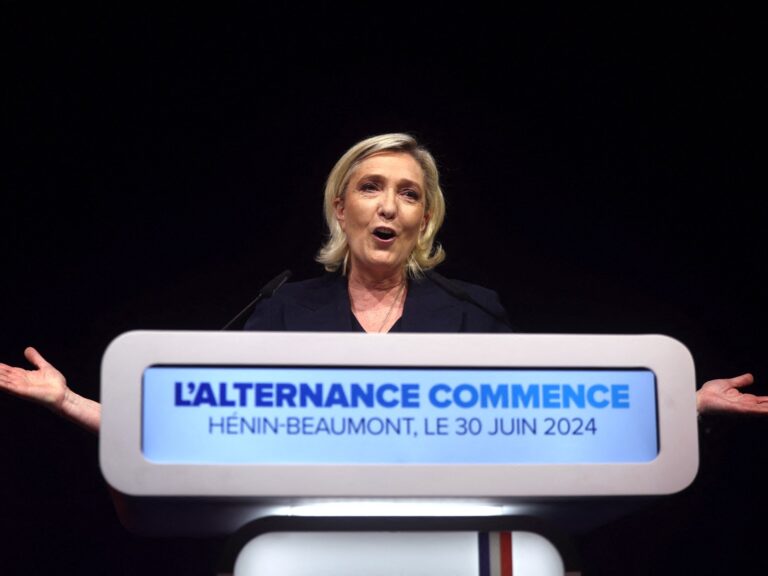Marine Le Pen and her far-right National Rally (RN) party won a landslide victory in France’s early elections, drawing backlash from rival parties at home and from politicians abroad.
The RN won a major victory in the first round of parliamentary elections, winning nearly 34% of the vote, but did not win an absolute majority in parliament.
Le Pen, who is trailing the left-wing New Popular Front (NFP) coalition with around 29 percent support and President Emmanuel Macron’s centrist Union Ensemble with around 20.5 percent support, called on French people to vote for her party in the second round.
Despite the defeat, Macron hailed the high voter turnout of 65.8 percent and reiterated his call to stand up to the far-right in the second round.
“In the face of this popular rebellion, the time has come to clearly forge a great Democratic-Republican coalition for round two,” the president stressed in an official statement.
Centre-left leader Jean-Luc Mélenchon said the president had suffered a “severe and indisputable defeat” and bore responsibility for the shock decision to dissolve parliament, but that stopping the far-right was his top priority.
“We will not give one more vote to the RN, we will not give one more seat to the RN,” he stressed.
“Confusion and failure”
The RN’s rise was welcomed by the far right of European politics.
Hungarian Prime Minister Viktor Orban expressed “optimism” following the results of the first round of voting.
Orban’s comments came as Hungary takes over the rotating presidency of the European Union, where critics fear the country’s authoritarian and pro-Russian government.
“We can’t continue like this in Brussels. We need change. That’s why the Belgian prime minister fell, why the French government fell,” Orban said in an interview with Hungarian television station M1 on Monday night.
“The first source of our optimism is that people want change, but the bureaucrats in Brussels don’t think so. They don’t want change,” he said. “But that strengthens our optimism, because it makes the fact that change is needed even more obvious.”
Fellow right-wing Italian Prime Minister Giorgia Meloni argued that attempts to “demonise” far-right voters were failing.
“There are constant attempts to demonize and corner people who don’t vote left, but fewer and fewer people are being fooled,” Meloni told Adchronos.
In Britain, opposition Labour leader Keir Starmer said the RN’s gains in France were proof the left must show that “only progressives have the answers” to Britain’s and Europe’s broader problems. Britain’s general election is on Thursday.
“We must make a progressive call, but in doing so we must understand why people are frustrated with politics in the UK after 14 years of chaos and failure, and we must return politics to its rightful role and continue to insist that politics is a force for good,” he said.

Israel’s Minister for Israelis Abroad Amihai Chikli said he was “impressed” with Ms Le Pen’s position, adding that Israeli Prime Minister Benjamin Netanyahu seemed to “share the same opinion”.
Chikli told France’s Caen broadcaster on Monday that Ms Le Pen becoming French president would be “great for Israel” given her “firm stance” on Hamas, the International Criminal Court and anti-Semitism. The next presidential election is in 2027. Most Jewish leaders in France oppose Ms Le Pen and RN.
Meanwhile, Polish Prime Minister Donald Tusk has issued a warning about the far right.
“They love Putin and uncontrollable money and power. And they are already in power or aiming for power in eastern and western Europe,” he said in an online post.
“They are in the European Parliament. In Poland, we reversed this deadly trend at the last moment. We must not let it go to waste,” he added.
German Chancellor Olaf Scholz and his cabinet appear to be respecting an informal ban on commenting on foreign elections.
But Michael Roth, a member of Mr Scholz’s Social Democrats, criticised his party for not supporting Mr Macron better.
“We are not showing enough consideration for the political debates and problems of other countries,” he added, saying that an alternative to Macron “is no longer [former French President Nicolas] “Not Sarkozy, but a far-right nationalist like Marine Le Pen.”
Spain’s socialist leader, Prime Minister Pedro Sánchez, also felt alarmed by the far-right’s victory in France.
“The rise of the far right in France is not unrelated to what is happening in other parts of the world, including in Spain, where we are seeing, directly and indirectly, a rise of the far right, both institutionally and in the opinion polls,” he said in an interview with Cadena Ser radio.
Meanwhile, French and European markets reacted positively to Monday’s election results.
French stocks and the euro rose, and the CAC 40 index, which represents the 40 largest companies listed in Paris, rose 2.7 percent at the opening before falling slightly.
The euro, which had been hit following Macron’s surprise announcement in early June over European elections, hit its highest level against the US dollar in more than two weeks.
European stocks also rose, with Europe’s STOXX 600 index recovering from last week’s declines thanks in part to a rise in the CAC 40 index.

